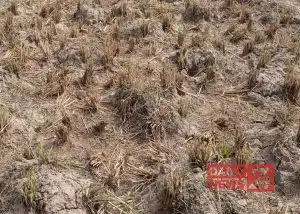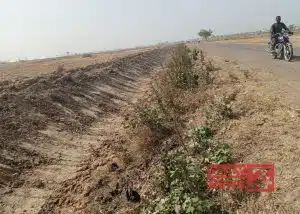After the closure of Tiga Dam by the Hadejia Jamaare River Basin Authority on November 1st last year, food security has reportedly been threatened in Kano due to the action.
Consequently, over 100,000 dry season farmers in Kura, Bunkure, and Garrin Mallam local government areas in the State have been stripped of their livelihoods. They rely on irrigation farming for survival.
Malam Salisu Tasi’u has depended solely on farming as a means to fend for himself and his family after his retirement more than a decade ago. But was inactive this season due to the closure of the Dam.
- Sojaboy donates educational materials, items to schools in Sokoto
- INEC trains 1,900 ad-hoc staff for Bwari Council election
“After I retired ten years ago, I depended on this irrigation farming to feed my family. But because of this development, I have been sitting at home doing nothing”, he said.
Similarly, another farmer, Alhaji Yusufa, who has been a consistent producer of Onion, Paper, Maize and rice in Kura Local Government, with an expected profit of over N200,000 on rice alone per season, cried out that he went bankrupt after the abrupt end of rainfall coupled with the closure of Tiga Dam.
“I produce onion, pepper, maize and rice every year, and I have profits of over two hundred thousand every year. Unfortunately, I have nothing left with me after using the money to feed my family”, he laments.
The closure has reportedly affected over 100,000 farmers in Kura, Bunkure and Garun Malam, as revealed by another farmer, Audu Mai Unguwa, who lamented that the Local Governments, which produced over a thousand trucks of tomatoes before the sudden closure of the Dam, could not produce even a single truck for export this term.
“The closure of dam has affected over 100,000 dry season farmers. Every season we sold over a thousand trucks of tomatoes, but we could not this year due to the closure”.
Hadejia Jama’are River Basin Development Authority (HJRDBA) had on November 1st last year shut down Tiga Dam for what it described as a significant rehabilitation under the Transforming Irrigation Management in Nigeria (TRIMING), a World Bank-funded project aimed at implementing the rehabilitation of the Kano River Irrigation Schemes (KRIS) and Hadejia Valley Irrigation Scheme (HVIS).
However, during a visit to the project site in Kura, our Correspondent observed that the agency has successfully rehabilitated over 60 per cent of the project.
Commenting, the Chairman of Kura Local Government Farmers Association, Usman Abdullahi Gamadan expressed optimism that the project will address the shortage of water experienced by farmers during dry season farming. He, however, pleaded with the agency to reopen the Tiga Dam to allow farmers in the affected areas to resume their farming activities.
“The project will address the challenges farmers are facing around here, but please, we want the agency to reopen the Dam so that our farmers can farm”.
Also commenting, an Agriculturist with Bayero University Kano, Dr Abdulwahab Salihu Shu’iabu, noted that the closure would negatively affect food production in the State.
He advised the affected farmers to dig a tube borehole in their farms to address the shortage of food in the State.
“No doubt, the closure will affect food production in Kano. However, if the farmers want to farm, they can dig a borehole so they can farm”.
Speaking on the development, the site Contract Coordinator, working with Transforming Irrigation Management in Nigeria (TRIMING), Engr. Sabi’u Dan Mallam said that over 65 per cent of the project had been completed so far.
Dan Mallam, however, assured that the rehabilitation project would be completed on March 31st, and the Dam will be reopened for farmers on April 1st this year.
“We have completed 65 per cent of the project, and we are expecting to finish the project on March 31st.
I want to assure the farmers that we will open the Tiga Dam on April 1st, this year”, he said.





